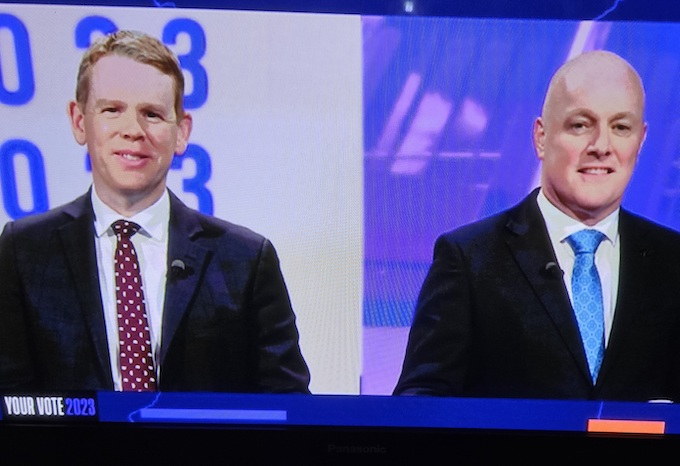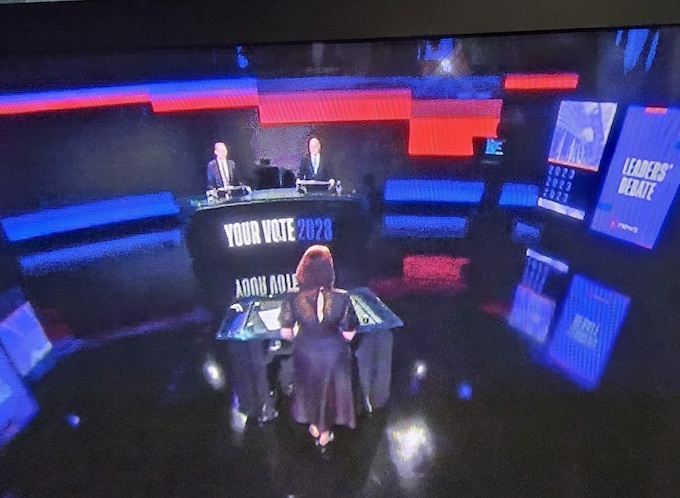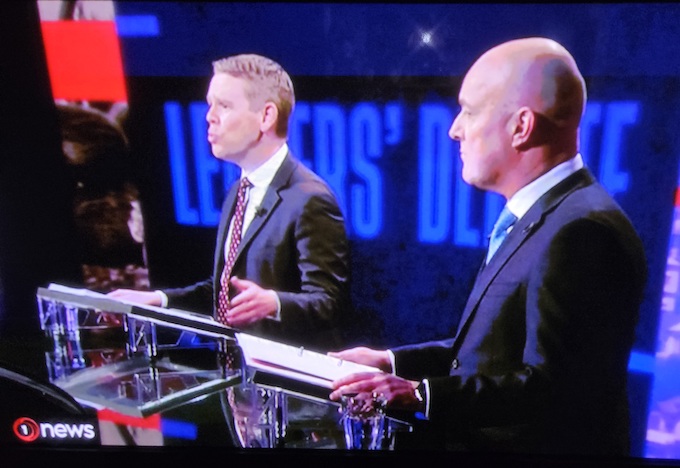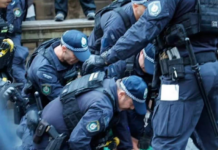
ANALYSIS: By Maree Mahony, RNZ digital journalist
Labour leader Chris Hipkins and National leader Christopher Luxon have faced off in a fast-paced but unspectacular debate in the Aotearoa New Zealand general election campaign with co-governance and gangs among the issues producing the liveliest exchanges.
It was the first time the two leaders had squared off against each other outside Parliament and at times the mood was tense during last night’s debate.
Luxon, in particular, appeared frustrated when Hipkins interjected, while the Labour leader appeared to be enjoying himself a bit more.
However, with Labour behind in the polls, Hipkins was unable to deliver anything telling enough to put Luxon off his stride.
He did manage some amusing lines, however, such as “We have a proven track record of reducing our emissions . . . it’s not just a bunch of slogans”, “building EV stations is like building petrol stations”, and when asked what was his worst quality he responded with a smile: “I need to delegate more”.
Afterwards both leaders professed themselves happy with how they performed, however, commentators on TV1 were less enthusiastic, with former MP Tau Henare saying there was no excitement and Hipkins had been “too mild”.
Former Labour leader David Cunliffe believed Hipkins had allowed Luxon too much of a free run and the National party leader made the most of it. Both declared the debate a tie.
Wide-ranging debate
The debate was wide-ranging, covering health, housing, crime and gangs, climate change and the economy. 1News political editor Jessica Mutch-McKay kept it moving at a fast clip and co-governance, especially in health, led to some intense debate.

The leaders were both asked if Māori and Pacific people should get priority when it came to the health waitlist. Luxon said need should come first ahead of ethnicity, while Hipkins said Māori and Pacific people having priority was a positive due to their poor health outcomes when compared to the rest of the population.
Hipkins said other parties were using the issue to “race-bait”, to which Luxon interjected “rubbish”.
Luxon said he felt the definition of co-governance had been expanded since the last time National was in government and the public had not been given adequate explanations of what it entailed.
Hipkins said co-governance meant shared decision-making over natural resources which had been successful. He believed Māori and government working together benefited New Zealand.
Luxon said he supported it for Treaty of Waitangi settlements but not for national public services and repeated his party’s intention of axing the Māori Health Authority.
“The Māori Health Authority isn’t having two separate systems,” Hipkins said.
Luxon challenged in Māori health
He challenged Luxon on why he would keep Māori health providers if he did not want two systems of health. Luxon said he wanted to “turbo-charge” community organisations but it would be as part of one health system.
Hipkins said the health system was dealing with systemic issues and it would take time to build capacity to fix them.
But Luxon said every single health indicator had worsened under Labour — although Hipkins countered that by saying falling smoking rates were one example of effective action.

Crime and gangs
Both men acknowledged the country had a problem with rising crime and Luxon in particular doubled down on his party’s intention to crack down on gangs.
He said he did not feel safe in downtown Auckland and believed many New Zealanders felt the same.
Under Labour the prison population had been reduced by 30 percent — which might have been acceptable if the crime rate had gone down by the same amount — but in fact it had risen sharply, Luxon said.
On gangs he claimed: “We have nine gang members for every 10 police officers in this country.
“We’re going to make sure we ban gang patches in public places, we give police dispersal and powers to break them up from planning criminal activity, we get tough on the illegal guns that they have and we make being a gang member an aggravating factor in sentencing.”
Consequences for young offenders
He also promised there would be consequences for serious young offenders.
Hipkins said the escalation in gang activity was unacceptable and acknowledged that more New Zealanders were feeling unsafe. However, he advocated working with young offenders to turn their lives around which would reduce crime.
On boot camps, told that an expert had said 83 percent of young people who went through them re-offend, Luxon said National would make them “more effective”.
“We need targeted interventions in these young people’s lives. I’m not prepared to write them off.”
When Hipkins tried to intervene and say how boot camps did not get results, Luxon hit back saying Labour had had six years to get it right.
Hipkins said Labour had changed the law so police could be tougher on gang convoys, such as the recent one that closed down parts of Ōpōtiki over a tangi.
Insults fly on housing
Luxon slammed Labour’s record on housing while Hipkins said National’s plan was to offer incentives to landlords whereas Labour was focused on getting people into homes.
Hipkins said there were more “mega landlords” these days and that was not right.
“Will you guarantee your tax breaks for landlords will get passed on to tenants?” Hipkins asked Luxon.
Luxon avoided a direct answer so the Labour leader answered on his behalf, saying “We’ll take that as a no.”
Both leaders stated they supported building more state houses — although Hipkins was critical of how state houses had been sold off the last time National was in government.
Hipkins admitted KiwiBuild had been an “unrealistic promise” but since then Labour had created momentum in house supply which needed to be continued.
Afterwards both leaders were relaxed. Hipkins was reluctant to score himself, saying the voters would decide, but when pressed again opted for an eight.
Luxon said he had enjoyed it and hoped viewers did also while also choosing an eight.
This article is republished under a community partnership agreement with RNZ.












































